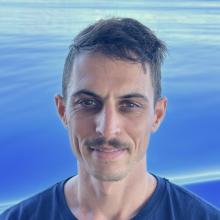
Daniel Tauriello
Tell us about your work/ research. What kinds of things do you do?
I develop and instruct sea-going laboratory exercises to support CCOM's ocean mapping curriculum and serve as relief captain of the Center's research vessel, R/V Gulf Surveyor. I also manage the vessel's scientific equipment and information technology infrastructure. In my bits of free time I am developing a novel mapping system to provide a cost-effective solution for autonomously collecting seafloor imagery from non-hydrographic vessels.
What sparked your initial interest in your career?
I started out as an hourly IT technician and eventually landed a part-time job as mate on a small survey launch. I really enjoyed physics and oceanography courses as an undergraduate and came to realization that ocean mapping required a deep understanding of these subjects in addition to the computer science skills I was already developing. Plus, it meant I that got to practice all of these disciplines while being on the water. This realization compelled me to complete a graduate degree in earth science with a specialty in ocean mapping, and to become a licensed captain.
Who influenced you or encouraged you the most?
My grandfather always encouraged me to find something that I love to do, and then to be the best at it. He loves to hear about the challenges associated with marine research and helped me believe that I am capable of persevering through any technical problem I encounter. He never had access to an education that would allow him to fully pursue his dreams, so I've tried to honor his hard work and sacrifice through my actions.
What element of your work/ study do you think is the most fascinating?
I really enjoy pushing sonar systems to do things beyond their initial design intent. This manifests as hacking their communication protocols, tuning them to image non-standard targets, or integrating them with other pieces of equipment.
How did you get involved with Ocean Exploration Trust? How did you become part of the expedition team?
I have interacted with members of OET in my role at CCOM and was invited to be part of the expedition.
What other jobs led you to your current career?
I got a lot of experience working on the water while serving in a number of roles as an aquaculture researcher. I've built and operated a European oyster hatchery, grown Pacific white shrimp indoors, and raised steelhead trout offshore, among other things.
What are your degrees and certifications?
Bachelor of Science in Marine Biology- University of New Hampshire 2015
Masters of Earth Science, Ocean Mapping- University of New Hampshire 2023
What are your hobbies?
I am a professional drummer and avid skier, climber, and mountain biker.
What advice would you give someone who wants to have a career like yours?
Spend some time at sea before committing to a career that requires it. Also, basic IT skills are invaluable in a research environment. If you are unsure of exactly what you want to do, spend some time learning how to build a computer, learning basic system administration and networking concepts, and get familiar with a high-level programming language. These skills will be useful for almost anything you do.
Expeditions
Daniel participated in the following Ocean Exploration Trust expeditions:
